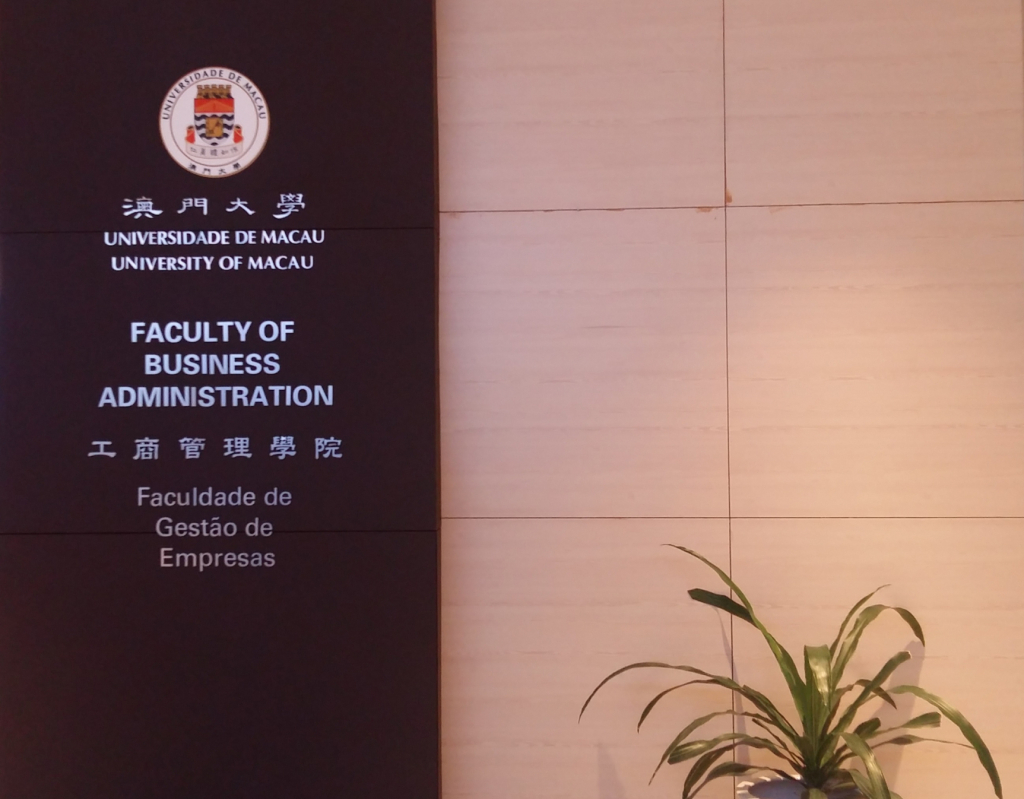The Programme
- Rigorous academic training with a focus on Macau and the Greater Bay Area. One unique feature of our Programme design is to nurture more finance professionals for Macao and promote economic diversification in the city.
- Sharing from Industry Experts. To bridge the textbook theories with real world, the Programme invites senior practitioners from financial institutions to share their knowledge and views in the classroom. Starting the first semester of the 2019/2020 academic year, senior executives of the Bank of China (Macau Branch) start to deliver guest lectures on financial services in Macao to both undergraduate and postgraduate students at UM.
- World-class study and living environment. The UM and FBA provides world class facilities to students to study in our beautiful campus. Our facilities include Thomson Reuters Trading Room, Finance and Economics Laboratory, Currency Museum, etc. For more facilities in FBA, please visit here.
- A mixed model of fresh graduates and working students. All local and non-local fresh graduates and working students study together in working day nights, provide a better interaction among students to learn from each other.
Mission
To cultivate financial talents with international competitiveness for financial innovation and economy diversification in Macau and the Greater Bay Area.

Programme Intended Learning Outcomes
- PILO1: Identify financial needs and problems faced by investors/corporations.
- PILO2: Develop or apply financial models and techniques to solve advanced problems in finance.
- PILO3: Apply statistical software for intermediate-level statistical and econometric analyses.
- PILO4: Conduct applied research individually.
- PILO5: Exercise effective communication skills for finance research writing.
The normative study period of MSc in Finance programme would be two years. Students are required to complete four compulsory courses, six elective courses, and project report writing within regulated timeframe for graduation. The medium of instruction in this programme is English, all lectures are normally held on weekday evenings.
- For intakes of 2020, 2021 intakes & onwards

This course aims at introducing contemproary theories, models, issues and practices relating to business eithics and corporate governance and social responsibility and imparting an ethical mindset to the students in the conduct of business and the treatment of accounting information. Topics include the concept and theories of corporate governance; corporate governance principles, functions, structures and mechanisms; corporate governance models, standards, regulations and practices; the roles of different corporate stakeholders in corporate governance; current debates over corporate governance regulation and practice, causes and consequences of corporate governance failures; design and assessssment of measures to improve corporate governance, corporate social responsibilities and socially responsible investing; and trends and emerging issues in corporate governance. (Offered by MSc in ACCT)
This course introduces the basic tools with the aid of data for decision making in finance. It covers introductory probability, decision analysis, basic statistics, regression, simulation, linear and nonlinear optimization, and discrete optimization. Computer Programming exercises, cases, and examples, deliver in SAS® (by the SAS Institute Inc.) are drawn from asset pricing, market microstructure, derivatives, and other functions.
This course is designed to provide students a roadmap for effective organization leadership. Through reviewing contemporary theories of leadership and classical theories of ethics, it encourages students to form their own perspectives on leadership and ethics. The course discusses crucial aspects of leadership, such as power, integrity, motivating employees, feedback, and coaching. It also develops students’ leadership awareness to address the expectations of diverse organizational stakeholders. Special consideration will be given to the role of ethical leadership in ensuring that firms balance their diverse social responsibilities and maintain robust ethical safeguards, while resolving ethical problems and drawing appropriate lessons from them. The course will incorporate topics on sustainability and SDGs, by doing so, it prompts students to consider the importance of leadership in ensuring the long-term success of firms. (Offered by MBA)
This course offers students a more advanced understanding of important concepts in the field of corporate finance. It covers basic topics including capital budgeting, alternative valuation methods, capital structure decisions, corporate payout policy, securities offering decisions, as well as more advanced topics (optional) such as corporate governance, mergers and acquisitions, and corporate risk management. The objective of this course is to provide students with essential tools to study more advanced courses in finance.
This course focuses on designing and managing investment portfolios for investors. It introduces students to investment media and techniques. It analyzes capital market theories, the pricing efficiency of security markets, investment strategies, and investment performance evaluation. Topics therefore include investor risk preferences, modern diversification theory, securities analysis, asset pricing models derivative instruments (models and real would behavior), investment strategies. Investment strategies include both the passive and active strategies, technical trading strategies and trading strategies arose from market anomalies.
This course is structured around the microeconomic problems of financial management of banking firms. It focuses on decision making and offers a unique approach to understanding commercial bank management. Topics to be covered include banking trends and competition, performance analysis, liquidity planning, interest rate risk management, credit risk analysis, cost of funds, and capital management. Both domestic and international banking activities will be examined. The objective of this course is to provide the student with the conceptual framework necessary to analyze and comprehend the current problems confronting managers of commercial.
This course focuses on risk management techniques in multinational corporations and credit risk management. A strand of risk management topics would be covered such as foreign exchange, money market instruments, derivative products, risk exposure of corporations, measurement of exposure, and risk management in financial institutions. The credit risk will discuss various economic and financial factors that affect credit quality of corporations, evaluating corporation’s debt servicing ability and their likelihood of default. Topics covered will include business and financial risk analysis, debt covenants, security structures, credit scoring and credit rating models.
This course covers advanced topics in finance that may arise due to the advances in the areas of corporate finance, investment and banking. The topics will be timely and may arise through emerging theory, new model or empirical research in the finance world.
The financial industry is undergoing profound changes in the past several years. With the arrival of new technologies, financial services firms are increasingly using these new technologies to increase their efficiency, develop new businesses and services, and revolutionize their marketing practices. The lines between financial services and technology firms have also blurred, as we are seeing more and more technology companies venturing into the finance industry, particularly in China.
This course aims to provide you with an overview of FinTech and its implications within the finance industry and beyond. We will review companies in the FinTech industry, their businesses, products, and technologies. We will also cover the basic technologies that power the FinTech revolution, such as Artificial Intelligence (AI), Blockchain (B), Cloud Computing (C), and Big Data (D). We will also discuss FinTech’s current status and future trends. After this course, you will have a basic understanding of the FinTech landscape and be ready to explore more about it.
The objective of this course is to introduce the financial planning process and apply some of the tools to formulate investment plans for managing, preserving and growing wealth across the client segments the high net-worth individuals.
It covers topics on the economic development and transition of Macau; the China-Portuguese speaking countries economic cooperation; integrated resorts, gaming, and hospitality industries in Macau; and banking and finance sectors of Macau. Special topics such as green development projects employed by the integrated resort operators, and Macau’s economic collaboration within the Greater Bay Area are discussed. The objective is to provide a foundation of current economic and financial developments in Macau to evaluate gaps and find opportunities for future economic and financial developments.
This course covers the structure, functions, operations and regulations of financial markets and institutions. It covers the latest developments in the financial industry, such as financial leasing, RMB clearing centres. We examine markets such as bond markets, stock markets, foreign exchange markets including Renminbi market, derivative markets, and will also examine the role of financial institutions such as commercial banks and mutual funds. This course will be helpful to identify potential financial markets developments that are suitable for Macao under the public desires in developing its featured finance.
This course is designed for MSc in Finance students to understand international finance and derivative securities. Students will apply the knowledge of mathematics of finance to the pricing and valuation of derivatives in general and currency derivatives in particular, e.g., forwards, futures, swaps, and options. Discussions will be extended to concepts of how to use derivatives to speculate, hedge and arbitrage. General topics covered are pricing models, trading strategies, and risk management using the derivatives.
Students are required to identify a real financial issue faced by companies and provide a data driven solution in the Project Report. The issue can come from any finance area, and can be local or international in scope.
For more course information, please visit UM course catalog.
Our teaching faculties received their PhDs from world-renowned universities in P.R. China, Hong Kong, Singapore, Canada, United States, United Kingdom, Portugal, and Denmark. They do not only put huge efforts on teaching, but also produce world-class researches. Our faculty members have been published in top journals such as Management Science, Journal of Finance, Journal of International Business Studies, Journal of Accounting and Economics, The Accounting Review, Journal of Corporate Finance, Tourism Management, and Annals of Tourism Research. In addition, our faculty members are also conducting consultancy projects related to the Macau economy. Some faculty members are CFA charter holders while some others also have industry working experiences. For more information, please browse in our department website.

